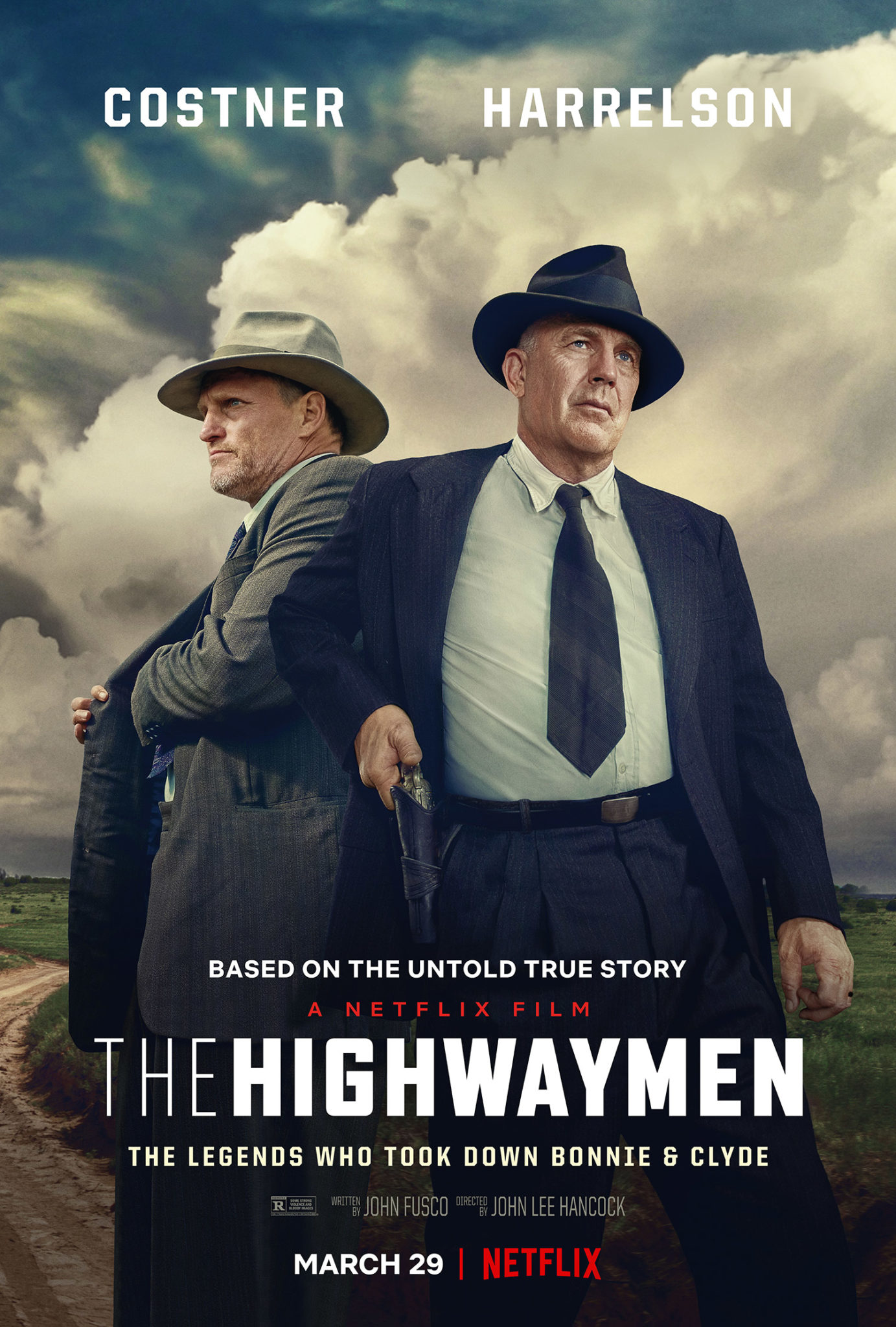Review: The Highwaymen
One story in the classic British crime drama Cracker was of a couple on a Bonnie and Clyde type crime spree. When one of them was apprehended, Fitz, the criminal psychologist whom the show was about, questioned her
Fitz: What’s your favourite bit of Bonnie and Clyde?
Tina: Never seen it.
Fitz: You have.
Tina: Part where they look at each other.
Fitz: Before they die?
Tina: Yeah.
Fitz: Brilliant, after all they’ve been through. And they just look at each other, and relive every moment, then die in a hail of bullets. God I cried! I did, really. I cried. Did you cry?
Tina: Yeah.
Fitz: You did? You cried? I cried. “The bit where they look at each other before they die.” Ha!
Tina: And the birds take off.
Fitz: Right. They know what’s going to happen, and then they die. God, I wept buckets. I wept buckets. I thought it was one of the worst moments in the entire history of Hollywood. I wept buckets for all the victims and all the families of the victims. You see, I’ve been to their homes, Tina. I’ve seen it. I’ve seen what violent death does in a family. The grief, the numbness, the bitterness. I’ve seen them trying to imagine what they went through in their last moments. I’ve seen that grief, you stupid little b***h. It’s always caused by empty-headed, self-centred, sentimental pieces of s**t like you!
 That’s how I feel about Bonnie and Clyde. Its stars, Faye Dunaway and Warren Beatty, are a glamorous pair; the poster screamed “They’re young…they’re in love!” adding in rather smaller type “…and they kill people”. Thanks largely to the film, the pair have passed into legend as latter day Robin Hoods who, in the depths of the Great Depression, robbed the banks which were exploiting the poor.
That’s how I feel about Bonnie and Clyde. Its stars, Faye Dunaway and Warren Beatty, are a glamorous pair; the poster screamed “They’re young…they’re in love!” adding in rather smaller type “…and they kill people”. Thanks largely to the film, the pair have passed into legend as latter day Robin Hoods who, in the depths of the Great Depression, robbed the banks which were exploiting the poor.
There is hardly a shred of historical truth to this. In real life Bonnie Parker and Clyde Barrow were just a pair of criminal thugs. The first victim of their gang was John N. Boucher, the owner of a filling station and pawn shop in Hillsboro, Texas, who was killed in the course of a robbery in April 1932. On Boxing Day that year, Barrow shot and killed Doyle Johnson, a twenty-seven year old grocery clerk, while trying to steal his car. The balance of their victims were law enforcement officers, sometimes killed with merciless brutality. Almost none of this made it into the movie.
 Fortunately, a new film on Netflix, The Highwaymen, goes some way towards remedying this. It tells the story of the two lawmen, Frank Hamer and Maney Gault, who hunted Parker and Barrow down in May 1934. Both Kevin Costner and Woody Harrelson are excellent in the lead roles. Adding this to his performance as Elliott Ness in The Untouchables, Costner has it on him to be one of the great screen lawmen, a worthy heir to Gary Cooper.
Fortunately, a new film on Netflix, The Highwaymen, goes some way towards remedying this. It tells the story of the two lawmen, Frank Hamer and Maney Gault, who hunted Parker and Barrow down in May 1934. Both Kevin Costner and Woody Harrelson are excellent in the lead roles. Adding this to his performance as Elliott Ness in The Untouchables, Costner has it on him to be one of the great screen lawmen, a worthy heir to Gary Cooper.
Hamer actually appeared as a character in the 1967 film. There, he is captured by Parker and Barrow, teased a little, then let go, before ungratefully slaughtering them at the film’s climax. Needless to say, in reality Hamer was never captured by the pair. The film made it up.
The Highwaymen is much more accurate and, as a result, demythologizes Bonnie and Clyde. We get more insight into the effects of their crimes on the victims and their families. We get a clearer view of the crimes themselves, starting with the brutal executions of two young highway patrolmen, H. D. Murphy and Edward Bryant Wheeler, in Grapevine, Texas. The film shows the weird celebrity status the pair had and how they were romanticized even at the time. In one scene, a gas station attendant tells Hamer “If it’s Bonnie and Clyde you looking for, I didn’t see ’em. And if I did, all the luck to ’em. They’re only taking from the banks who are taking from the poor folk, like me.” Hamer replies “There’s a peace officer, he died in a puddle of himself back in Dallas. He was trying to get the shells out of his pockets…when his head was blown off, Easter Sunday morning. His family will be on the breadline next week. All luck to ’em? All luck to ’em?”
Fitz was right, Bonnie and Clyde is a pretty but narcissistic travesty. The true story of Bonnie, Clyde, their victims, and the men who hunted them down, deserves a better telling. In The Highwaymen, it finally gets it.
John Phelan is an economist at the Center of the American Experiment.